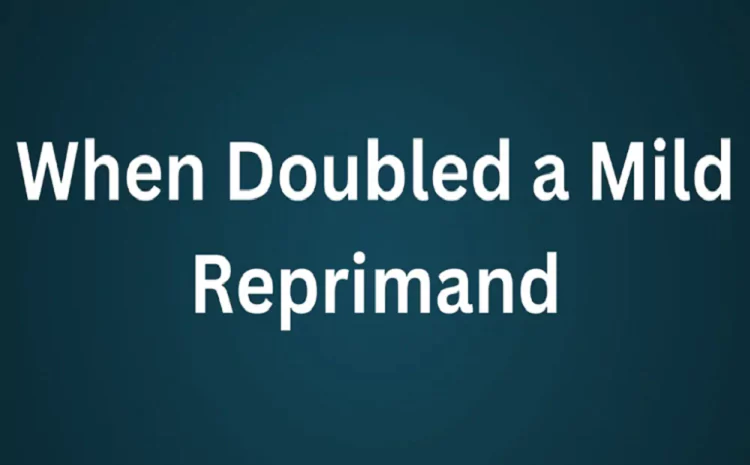Have you ever found yourself in a situation where you needed to correct someone, but you didn’t want to come across too harshly? That’s where the art of a mild reprimand comes in. But what happens when you double it? Does it become more effective, or does it lose its gentle touch? In this article, we’ll explore what mild reprimand is, how doubling it can affect communication, and how to find the right balance between constructive criticism and harmful correction.
Understanding Mild Reprimand
What is a Mild Reprimand?
A mild reprimand is essentially a soft, gentle form of criticism. It’s a way to address a mistake or correct behavior without causing embarrassment or frustration. Think of it as a nudge in the right direction rather than a shove.
Common Scenarios for Mild Reprimand
We commonly use mild reprimands in everyday situations. At work, it might be a subtle reminder to meet deadlines. In relationships, it could be a gentle request to be more considerate. Whether it’s at home or in the office, mild reprimands help keep things on track without making anyone feel small.
Subtle Art of Criticism
The beauty of a mild reprimand lies in its subtlety. It’s less about what you say and more about how you say it. This form of correction avoids direct confrontation and instead uses a softer approach, which often leads to better results.
Psychology Behind Reprimanding
Why Do People Reprimand?
At its core, reprimanding is about correction. People reprimand others to improve behavior, correct mistakes, or maintain standards. However, the tone and delivery of that reprimand can greatly influence how it’s received.
Role of Tone in Delivering Criticism
The tone is crucial when delivering a mild reprimand. A calm, understanding tone can make the message more palatable. On the flip side, even a mild reprimand delivered with a harsh tone can feel accusatory and cause defensive reactions.
Difference Between a Mild Reprimand and a Harsh Critique
The difference between a mild reprimand and a harsh critique often comes down to intent and execution. A mild reprimand aims to gently correct while maintaining the relationship’s integrity. In contrast, a harsh critique can feel more punitive and damaging.
What Happens When Mild Reprimand is Doubled?
Amplifying the Effect Without Going Overboard
Doubling a mild reprimand means repeating the same corrective message. When done carefully, it can reinforce the point without escalating the situation. The key is ensuring the tone and message stay gentle to avoid it feeling like an attack.
Examples of “Doubling” in Different Contexts
In the workplace, a manager might remind an employee twice about meeting a deadline. In family life, a parent might gently ask their child twice to clean up after themselves. Doubling here strengthens the initial message but keeps the relationship intact.
Emotional Response to a Repeated Mild Reprimand
People may respond differently to a doubled mild reprimand. Some may appreciate the reinforcement, understanding that the issue is important. Others may feel frustrated or under pressure if the message is not carefully managed.
Balancing Constructive Feedback
How to Provide Constructive Criticism Without Causing Harm?
When offering constructive feedback, be clear, concise, and empathetic. It’s essential to address the behavior, not the person. For example, saying, “I noticed the report was late” focuses on the action rather than attacking the individual.
Ensuring a Reprimand Stays “Mild” but Effective
To ensure a reprimand stays mild, it’s crucial to focus on the issue at hand and avoid piling on additional criticism. A mild reprimand should leave room for improvement without damaging the person’s confidence.
What Happens When a Reprimand Goes Too Far?
Even the most well-intended reprimand can go too far if delivered poorly. When a mild reprimand turns into constant nagging, it can cause resentment, leading to the opposite effect of what was intended.
Practical Applications of Mild Reprimand in Daily Life
In the Workplace
In a professional setting, mild reprimands are often used to guide employees toward better performance without demoralizing them. Managers who master this technique can motivate their team while addressing areas for improvement.
In Friendships and Relationships
In personal relationships, a mild reprimand might sound like a gentle reminder to be more considerate or mindful. These moments of gentle correction can strengthen bonds if handled with care.
In Parenting
For parents, mild reprimands can teach children responsibility and respect without fear. Asking your child twice to clean their room, for example, can encourage discipline without causing frustration or rebellion.
Benefits of Mild Reprimand When Used Properly
Encouraging Positive Change
One of the key benefits of a mild reprimand is its ability to inspire positive change without breaking the person’s spirit. It encourages growth through gentle reminders rather than harsh consequences.
Maintaining Healthy Communication
Mild reprimands help keep communication channels open. Since the message is delivered gently, people are more likely to listen and act upon it rather than become defensive.
Reducing Conflict While Addressing Issues
When done correctly, mild reprimands can address problems without sparking arguments or tension. This makes them an effective tool for resolving conflicts in both personal and professional settings.
How to Respond to a Mild Reprimand?
Keeping Composure When Receiving Criticism
Receiving even a mild reprimand can be challenging, but maintaining composure is key. Focus on the message rather than the delivery, and try not to take it personally.
Turning Reprimand Into a Learning Opportunity
Every reprimand, whether mild or not, presents a chance to improve. Look for the lesson in the message and use it to grow rather than dwell on the criticism.
Avoiding Overreaction
Overreacting to a mild reprimand can escalate the situation unnecessarily. By keeping calm and staying open to feedback, you can prevent the conversation from turning into a confrontation.
Conclusion
Mild reprimands, when used effectively, are a powerful tool for delivering constructive criticism while maintaining relationships. When doubled, they can reinforce important messages without losing their gentle touch, if done thoughtfully. Whether in the workplace, at home, or in social interactions, mastering the art of a mild reprimand can lead to positive outcomes and healthier communication.









